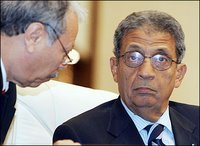Arab League Summit Guarantees Amr Moussa’s Salary for next Year
 The Arab League Summit held in Khartoum dealt another blow to the Arab nationalists; one Arab world day dreamers.
The Arab League Summit held in Khartoum dealt another blow to the Arab nationalists; one Arab world day dreamers.Ten of the 22 leaders did not bother to show up in Khartoum, and most of those who did were gone by Wednesday morning, before the summit had officially concluded.
Saudi Arabia delivered the final blow to the Arab League summit in Khartoum this week. To the apparent dismay of Amr Moussa, the league's secretary-general, Ghazi al-Gosaibi, the labour minister representing King Abdullah, declared that the kingdom would not host the yearly gathering next year, leaving it to be held in Egypt, home of the league.
No one knew what had prompted the Saudis to decline to host next year's summit. Some diplomats speculated that the prospect of greeting Col Gadaffi in Riyadh was too disagreeable. The colonel and the Saudi king exchanged insults during a 2003 summit. Relations have deteriorated since then amid allegations of a Libyan plot to assassinate the Saudi leader.
There were the usual theatrics of Libyan leader Muammer Gadaffi, who walked out because he could not address the open session. Lebanon, where the anti-Syrian parliament majority is trying to remove the pro-Syrian president Emile Lahoud, sent two competing delegations which refused to sit together and lobbied at cross-purposes. The president and the prime minister, Fouad Siniora, openly clashed in a closed session.
Not only that Arab leaders were discussing international issues but the head of the Arab League called on Arab states last Tuesday to work toward "entering the nuclear club" by developing atomic energy — a new concern for a Western world already trying to rein in Iran’s nuclear ambitions and fretting about a possible Mideast arms race.
Arab League resolution pledged only vague support for the Sudanese government at the outset of a summit that does not commit Arab members to any financing of African Union (AU) forces, as the US had hoped for.
Iraq, Syria, Darfur and Palestinian territories were on the Summit's agenda but those issues are no longer considered Arab, they are rather international and handled through the United Nations in coordination with the international communitty. Why do Arab leaders pretend to have a say on issues that they had never been a key players in such issues?
Arab states refuse pressuring Syria, sending Ambassadors to Iraq or peace keeping troops, and supporting and sending U.N. international peace keeping troops in Darfur. Israel is taking unilateral initiatives by deciding on drawing Israel's borders by 2011.
I guess the only decision that the Arab leaders were able to take was the renewal of the Arab nationalists mouthpiece Arab League Secretary General Amr Moussa's term.










1 Comments:
Dear FFE,
Very interesting...
You forgot to mention the fact that the President of Egypt failed to attend the summit in 'brotherly' Sudan.
For an interesting article go to:
http://weekly.ahram.org.eg/2006/788/re2.htm
There is also alleged antagonism towards Mr Mousa from the economically powerful Gulf States because he is supposedly patronising and is suspected to be the mouthpiece of 'Egyptian' as opposed to pan-Arab interests...
For more insight go to:
http://weekly.ahram.org.eg/2006/788/re3.htm
I am disappointed that the Sudan Peoples' Liberation Movement politicians did not lobby for bringing up the case of the massacre of the Sudanese refugees at Mustafa Mahmoud.
Post a Comment
<< Home